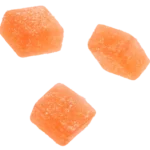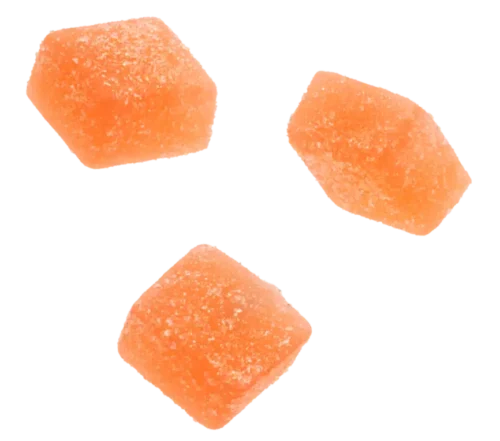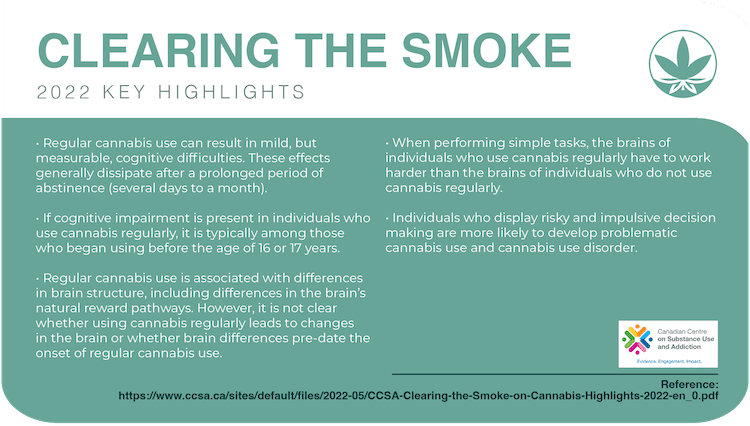Common Side Effects Of THC Gummies


Christopher Visser
Multi-Cannabis Business Owner
Christopher Visser, the Founder and CEO of Cannabidiol Life and THCGummies.com, is a distinguished figure in the CBD industry, recognized for his pioneering contributions since 2016. With over 120 published articles, Christopher has become a reputable cannabis researcher, writer, and author. He's built two prosperous cannabis ventures that collectively generated millions in annual sales. His in-depth analysis of numerous cannabis studies, collaboration with medical professionals, and personal engagement with thousands of customers underline his expertise and commitment to advancing cannabis understanding daily.
-
 Written By:
Christopher Visser
Written By:
Christopher Visser
- Published:
- Updated: February 27, 2024
- Too Quiet, Light Up The Convo!
With the increase in consumers buying THC gummies, comes the need to understand what potential side effects may arise from their consumption.
From short-term effects to long-term risks, let's explore the health-related impact of THC gummies.
Table of Contents
- Tags: Common, Short-Term
POP QUIZ!
What's not a common side effect of THC Gummies?
A) Itchy SkinB) Red Eyes
C) The Munchies
D) Dry Mouth
Correct Answer: A
|Itchy skin is not a common side effect when consuming THC gummies and has only ever been reported due to an allergic reaction to a separate ingredient used in the THC gummy product formula.
A Categorized List of Side Effects From THC Edibles & Gummies
Cannabis edibles have psychoactive & psychotropic effects when consumed; below you’ll find an extensive list of adverse effects with each point supported by scientific research:
Physiological Effects
- Dry Mouth (Cottonmouth): This is a well-known effect of cannabis use, related to its action on salivary glands. A study titled “Cannabinoid receptors in submandibular acinar cells: Functional coupling between saliva fluid and electrolytes” touches on this phenomenon.
- We wrote an article on this topic, Why do edible cause dry cottonmouth?
- We wrote an article on this topic, Why do edible cause dry cottonmouth?
- Increased Heart Rate: Research such as “Cardiovascular system effects of marijuana” discusses the cardiovascular effects of THC, including increased heart rate.
- Bloodshot Eyes: The effect of cannabis on causing vasodilation and resulting in bloodshot eyes is well documented but more often described in broader literature rather than specific studies. For this reason, this source isn’t a study, but a great article with links to the broader studies: Why Do Edibles Make Your Eyes Red?
- Dizziness: A study, “Cannabis, a complex plant: different compounds and different effects on individuals”, indirectly discusses symptoms like dizziness as part of THC’s effects.
- Impaired Coordination: The impact of cannabis on psychomotor control and coordination is explored in “Effects of marijuana on equilibrium, psychomotor performance, and simulated driving”.
- Memory Impairment: Memory Impairment: For a comprehensive understanding of how cannabis affects memory, the National Institute on Drug Abuse provides a detailed overview in their article “What are marijuana’s long-term effects on the brain?”. This resource highlights substantial evidence, particularly during developmental stages, can lead to long-term or potentially permanent adverse changes in the brain.
- Slowed Reaction Time: For a detailed exploration of how cannabis affects reaction times, consider the study “Marijuana and motor vehicle crashes” which discusses the relationship between cannabis use and impaired driving performance, indirectly touching upon slowed reaction times.
- Increased Appetite (Munchies): The study “The endocannabinoid system in energy homeostasis and the etiopathology of metabolic disorders” discusses the role of cannabinoids in appetite stimulation.
- Sedation or Fatigue: Effects on sleep and sedation have been explored in various studies, including THC’s impact on sleep patterns. Effects of Cannabinoids on Sleep and their Therapeutic Potential for Sleep Disorders
- Decrease in Blood Pressure: Research exploring the longer-term impacts of cannabis on blood pressure, particularly among older adults, is detailed in “Cannabis is associated with blood pressure reduction in older adults – A 24-hours ambulatory blood pressure monitoring study”, which found a significant reduction in both systolic and diastolic blood pressure following three months of cannabis treatment.
- Respiratory Irritation: The article “Respiratory effects of marijuana and tobacco use in a U.S. sample” provides insights into how smoking cannabis can lead to respiratory irritation, among other effects.
- Delayed Onset of Effects & Long-Lasting Effects: The pharmacokinetics of THC when ingested as an edible, leading to delayed onset and prolonged effects, is detailed in “Cannabis edibles: Blood and oral fluid cannabinoid pharmacokinetics and evaluation of oral fluid screening devices for predicting Δ9-tetrahydrocannabinol in blood and oral fluid following cannabis brownie administration”.
Psychological Effects
- Paranoia or Anxiety: The link between cannabis use and these mental states is discussed in “Cannabis use and risk of psychiatric disorders: prospective evidence from a US national longitudinal study”.
- Hallucinations or Distorted Perception: For an in-depth investigation into the relationship between cannabis use and the occurrence of hallucinations or distorted perceptions, the study “Cannabis use and expression of mania in the general population” offers valuable insights.
- Cognitive Impairment: The study “Residual effects of cannabis use on neurocognitive performance after prolonged abstinence: A meta-analysis” offers insights into this.
- Negative Mental Health Effects: Broad literature exists on the complex relationship between cannabis use and mental health, such as the review “Cannabis and mental health: put into context”.
- Acute Intoxication: The study “Acute and chronic effects of cannabinoids on human cognition—a systematic review” offers a comprehensive look at the impacts of cannabis intoxication, covering both immediate and long-term cognitive effects.
Gastrointestinal Effects
- Nausea or Vomiting: While THC is often used to combat nausea, especially in chemotherapy patients, high doses can lead to adverse effects. The therapeutic use is discussed in “Cannabinoids for control of chemotherapy induced nausea and vomiting: quantitative systematic review”.
Behavioral Effects
- Dependency or Addiction, Tolerance Development, Withdrawal Symptoms: The comprehensive report “The Health Effects of Cannabis and Cannabinoids: The Current State of Evidence and Recommendations for Research” by the National Academies of Sciences, Engineering, and Medicine discusses these aspects in depth.
- Risk of Overconsumption: The report “Cannabis Poisoning in the Pediatric Population: Trends in the Emergency Department Before and After Legalization” indirectly addresses the risks associated with overconsumption, particularly in contexts like pediatric accidental ingestion, highlighting the broader issue of overconsumption risks.
Interactions and Complications
- Interaction with Medications: For an in-depth analysis of how cannabis interacts with various medications, refer to the study “Cannabis interactions with other drugs: a systematic review”, which examines the complex interactions between cannabis and a range of pharmaceuticals, highlighting potential risks and considerations for medical professionals and patients.
- Accidental Ingestion: The study “Pediatric Marijuana Exposures in a Medical Marijuana State” provides insights into the risks and consequences of accidental ingestion, especially in children.
Legal, Social, and Environmental Implications
- Legal and Social Implications: These topics are more often discussed in policy and legal review literature rather than scientific studies.
- Environmental Impact: The environmental implications of cannabis cultivation and production have been explored in various reports and analyses, but not specifically related to edibles.
That completes the list from my research.
Now, let’s discuss when the effects can be experienced.
The Onset of Effects: When You'll Start Feeling The Effects Of THC Gummies

Ever wondered how long it takes for marijuana gummies to work their magic? The answer can vary, but generally, THC gummies take about 30 minutes to an hour to kick in. This is due to the fact that they need to be digested and absorbed by your body before you start feeling their effects.
It’s important to note that the onset time of marijuana gummies can be influenced by factors such as:
your metabolism
the type of cannabis gummies you consume
So, it’s always best to start with a low dose, give it some time to assess your high, and never take another serving unless 2 hours have passed.
The Duration: How Long The Effects of Weed Gummies Will Last
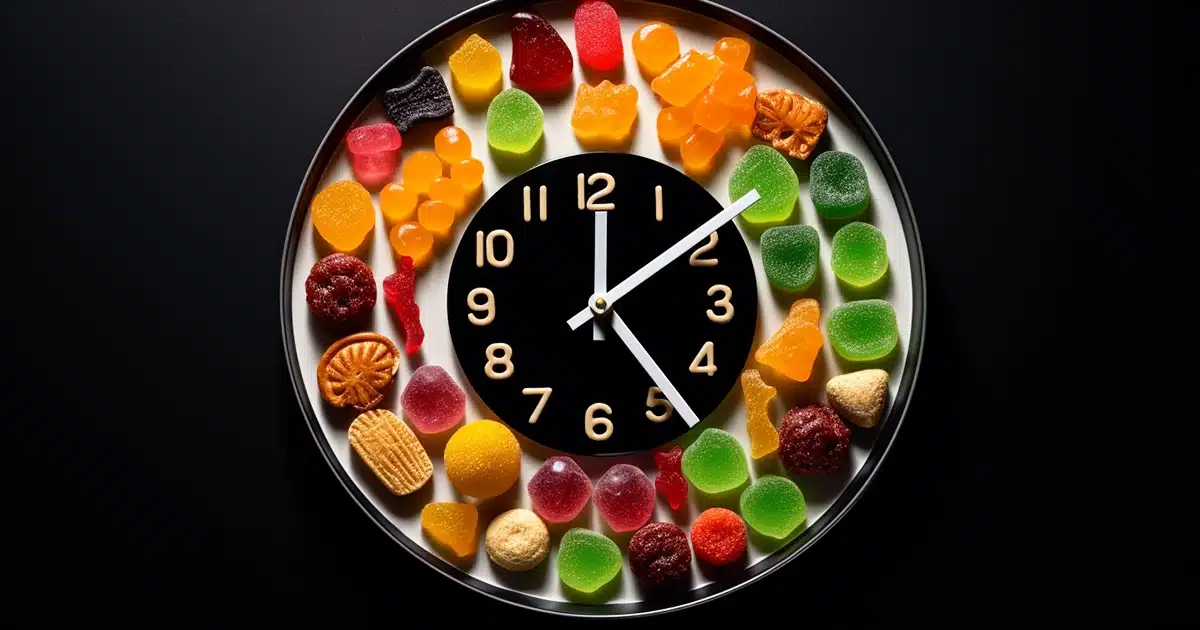
According to MedicalNewsToday.com, the duration of effects can last anywhere from 4 to 12 hours, depending on the dosage and individual tolerance, with the peak effects occurring around 2 to 3 hours after consumption.
At the end of the beautiful day, just remember that everyone’s experience with ∆9-THC gummies will vary. This especially pertains to the duration of the effects because it can be influenced by factors such as;
- Time of last Food intake (Edible effects based on a full or empty stomach)
- Body weight
- THC tolerance
- Cannabinoid Potency
- Metabolism
- Liver health
- Age
These several factors only scratch the surface of information that’s available as there is a lot more involved when it comes to the duration of THC gummies’ high effects.
SUPPLEMENTAL RESOURCE:
One of our most popular articles – How to make the effects of your THC gummies kick in faster, last longer, and hit harder!
What Science Is Saying: Quotes From Research Studies
In this section, we will share the information given from some of the most noted professionals and institutions who have conducted studies on THC gummies and the effects of cannabis edibles containing high levels of Tetrahydrocannabinol.
Please note that each reference below is paraphrased and if you wish to verify its accuracy, click the source link after each point.
“Edibles made with marijuana can be very potent and cause extreme reactions. A single serving of a commercially available edibles usually contain higher THC content than the original plant material it was derived from - insinuating it's easier to consume too much THC in today’s marijuana edible market because the products contain concentrated amounts of THC or the consumer was unaware of how much to take prior to consumption."
- Michael Smoker: Indiana University
"In 2019, a animal-study was conducted on mice which revealed that the effects of ingesting THC can have different impacts based on the mouse’s sex. The study also found that the mice had decrease levels of activity and lower body temperatures."
- Self-administration of edible Δ9-tetrahydrocannabinol and associated behavioral effects in mice
"THCV shows great promise as a potential solution to the challenges posed by obesity and type 2 diabetes. In rodent studies, this compound was found to reduce appetite, increase satiety levels, and enhance energy metabolism making it a candidate for weight loss management."
- Δ9-Tetrahydrocannabivarin (THCV): a commentary on potential therapeutic benefit for the management of obesity and diabetes
Short-Term Adverse Effects Of Weed Gummies: The Common & The Scary
When consuming THC gummies, most people report positive experiences, but some individuals ignore the warnings to not over consume and 9 out of 10 times, these bright crayons will experience less desirable effects.
Here, we’ll discuss the common and the scary short-term side effects of pot gummies to keep you informed.
Common Short-Term Side Effects
The short term side effects of THC gummies can range from mild to severe depending on the strength of the cannabis gummy and your overall sensitivity to THC (your THC tolerance).
Cannabis gummies that contain higher potencies of THC can evoke a range of sensory, psychological, and motor effects on users.
Here are a few more side effects that you might consider annoying, but not scary:
Cottonmouth (dry mouth): A common and infamous side effect of THC gummies is cottonmouth.
Increased appetite: Often referred to as “the munchies,” increased hunger is another typical effect of THC gummies.
Drowsiness: Some users may experience sleepiness or drowsiness, which can be helpful for those struggling with insomnia.
Red eyes: Glazed-over, bloodshot eyes might occur from THC gummies due to the increased blood flow caused by THC.
- Increased heart rate and blood pressure. THC can temporarily raise your heart rate, which can be concerning for those with existing heart conditions.
Further, you may feel:
- a sense of heightened awareness of color saturation
- shifts in temporal perception
- Emotional changes are common too – from elevated moods to instability
- physical movement could become hampered, possibly alongside difficulties with cognitive tasks such as problem-solving and memory recall.
Write this next part down and never forget it…
It’s EXTREMELY IMPORTANT TO REMEMBER that if you’re not used to ingesting cannabis products or if you’re sensitive to THC’s effects, these short-term side effects can be especially pronounced.
The Scarier Short-Term Side Effects
Anxiety: In higher doses, THC gummies might induce anxiety or paranoia in some individuals. It’s crucial to start with a low dose and gradually increase it to avoid this side effect.
Impaired coordination: THC gummies may affect motor skills and reaction times, making it unsafe to operate heavy machinery or drive.
Psychosis: In rare cases, its reported that higher doses of THC can lead to temporary psychotic symptoms (hallucinations and delusions); making psychosis an additional peril that cannabis abuse presents (source). However, some people enjoy the hallucinations. It’s worth noting, this side effect is more likely in individuals with a history of mental illness or a predisposition to it.
It’s essential to remember that everyone’s experience with THC gummies will be different, and side effects may vary from person to person. Always start with a low dose and follow the recommended guidelines to ensure a safe and enjoyable experience.
Long-Term Side Effects From Regular Use
When it comes to cannabis consumption, there are often terms used to define the lengths of time; take the following terms as examples:
- regular use
- long-term use
- frequent use
- chronic use
According to the Canadian Centre on Substance Use and Addiction (CCSA), LONG-TERM CANNABIS USE it is generally characterized by weekly or more frequent THC consumption, over extended periods of time.
Addiction
When it comes to long term side effects of eating THC gummies, one of the most commonly cited potential risks is “an increased risk for addiction if used on a regular basis.” – DrugAbuse.gov. In reality, it’s more so a strong habit-forming issue rather than a fierce NEED and dependance like opioid addiction.
As an FYI, THC consumption has also been linked to decreasing opioid use for patients suffering from chronic pain. Read more about this possibility with our article THC gummies for pain-relief.
Mental Health
Mental health and avid cannabis use are tragically intertwined; twice as many individuals, who consume marijuana regularly, suffer from severe psychological conditions.
"Additionally, upon consumption, THC travels swiftly throughout the body to reach its final destination - your brain. The hippocampus and orbitofrontal cortex are then activated resulting in challenges creating new memories as well as difficulty processing information."
- What are marijuanas long-term effects on the brain - NIH.gov
Strong evidence suggests that consistent Cannabis use is linked to a heightened risk of schizophrenia and other psychoses among individuals who have a family history with these illnesses.
There is also evidence that chronic marijuana users may experience other mental health issues such as anxiety and depression due to changes in neurotransmitter levels caused by prolonged use of cannabis products.
"Some potential risks associated with chronic marijuana use include decreased fertility due to hormonal imbalances; cognitive impairment; increases in blood pressure; decreases in testosterone levels."
- How Cannabis Use Impacts Long-Term Health - NorthWestern Medicine
The Worst Long-Term Effect From Edibles
While I completely agree that Schizophrenia and psychosis is pretty terrible, one can say, you’re already a little out of your mind, which is not the case for this next condition…
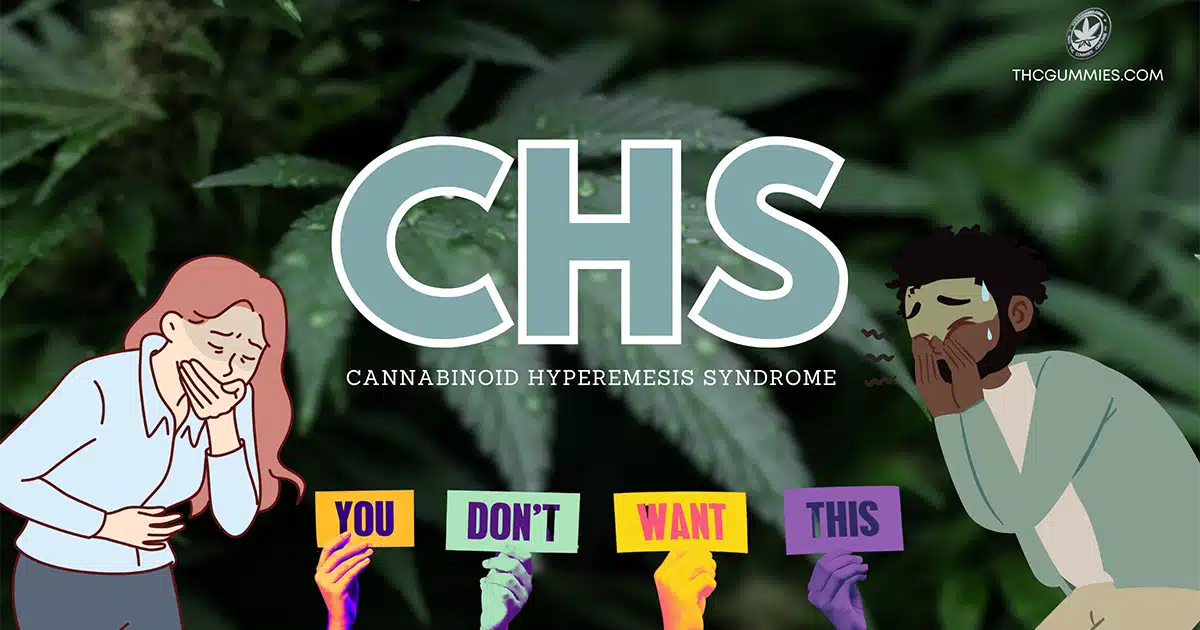
Its called CHS, which is short for Cannabinoid Hyperemesis Syndrome.
Side Effects In Young Adults & Adolescents
There is TONS of evidence that shows how consuming THC during the development years of a growing brain can cause a multiple of issues. Here at THCGummies.com, we compare this issue to the JENGA TOWER game (photo below).
Research On The Effects Of THC Edibles On Teenagers
A comprehensive study in New Zealand reveals that extensive marijuana use, especially during early years of life, can lead to an alarming decline in IQ levels: 6 or 8 points lower than average when measured as adults. This information comes from a study titled, “Impact of adolescent marijuana use on intelligence: Results from two longitudinal twin studies.”
Another study showed that regular Marijuana use has been linked to decreased self-esteem, academic underachievement, and career disappointments. Studies have shown that marijuana users are more likely to drop out of school and experience higher rates of job absences, occupational accidents or injuries than those who do not partake in substance abuse. This was a 2010 study title, “Marijuana use and high school dropout: the influence of unobservables.”
The Potentially Beneficial Effects of Edible Gummies
One of the benefits we can claim about THC gummies is that smoking cannabis products increases the risk for developing certain types of cancers such as lung cancer due to over extended periods of time. So, with THC gummies, that is avoided altogether.
One tip we always like to share is if you are taking THC gummies for the first time, consider also also taking some CBD gummies at the same time.
CBD (Cannabidiol), is the second most prolific cannabinoid in cannabis marijuana plants and it seems to lessen the side effects of THC when consumed simultaneously.
Visit our article on the benefits of THC gummies to learn more.
Conclusion
First and foremost, overconsumption; never do it.
On chance that you do, check out our product Undoo Relief. It helps counteract the effects of THC.
When it comes to edible products, always adhere to the instructions on the product label. There was a man in Colorado that decided to eat a weed cookie/brownie ended up eating six times more than he was supposed to and ended up jumping off his balcony because he was so impaired.
When considering whether or not you should consume THC gummies, it’s important to weigh the potential benefits against any potential risks involved with using them regularly.
Understanding the short term effects of marijuana as well as any possible long term consequences associated with chronic marijuana use can help you determine whether or not this form of cannabis consumption is right for you.
References
Smoking, Vaping, Eating: Is Legalization Impacting the Way People Use Cannabis? – PMC
https://www.ncbi.nlm.nih.gov/pmc/articles/PMC5010515/Association of unintentional pediatric exposures with decriminalization of marijuana in the United States – PubMed
https://www.ncbi.nlm.nih.gov/pubmed/24507243
Cannabis (Marijuana) DrugFacts | National Institute on Drug Abuse (NIDA)
https://www.drugabuse.gov/publications/drugfacts/marijuana
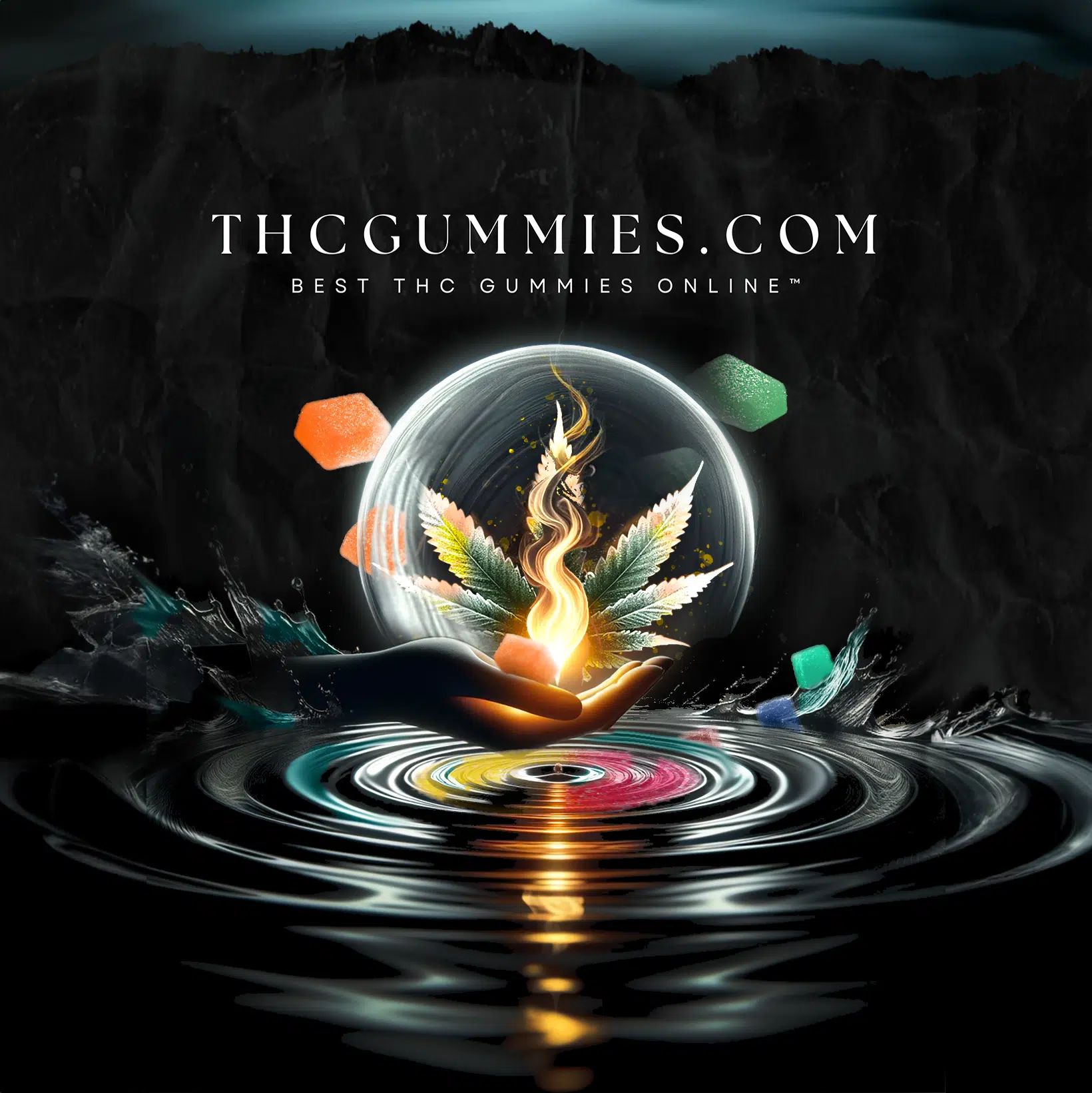
If this article sparked a new insight, pass the flame…
LET’S IGNITE RIPPLES OF CANNABIS WISDOM.
Be the catalyst for someone’s breakthrough moment.
SHARE ON SOCIAL MEDIA

Looking For Something Else?

